Posts Tagged ‘Boston University’
Sunday, February 2nd, 2014
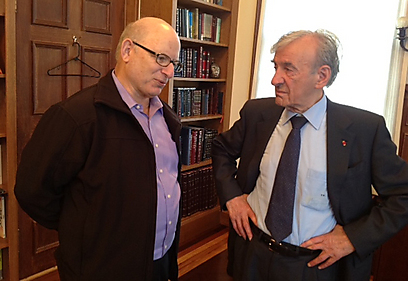
Elie Wiesel, right, in his office at Boston University with his Israeli editor, Yoel Rappel, whose interview with the famous survivor was published on January 28th in Israel’s Y-Net News.
By Carolyn Yeager
“Personal reasons” has been given for Elie Wiesel’s failure to attend this year’s annual International Day of Commemoration in Memory of Victims of the Holocaust at Auschwitz-Birkenau January 27th. This United Nations-declared commemoration day (since 2006) is being incorrectly called “Holocaust Memorial Day” or “Holocaust Remembrance Day” by the media and others who don’t feel like repeating the long, actual title.
The latter can become a problem because, as Wiesel’s interviewer pointed out in what follows : “The American nation officially commemorates the memory of the victims of the Holocaust on the same day as the State of Israel” — that is, on Yom Hashoah according to the Hebrew calendar, which falls in the Spring (April or May). This event is called “Days of Remembrance” and lasts for 7 days, beginning on Saturday evening Shabbat and ending at Shabbat one week later. In this, like in so much else, the U.S. is in lock-step with Israel (with Israel leading, the United States Congress following).
However, both the U.S. and Israel also support and join in with the newer January 27th United Nations-proclaimed commemoration, since it was conceived and pushed through the UN by the State of Israel. See here at bottom of page. That gives the world two major “Holocaust remembrance” events, all the better to “engrave” the holocaust into the minds of all humanity, but especially Western man.
The Interviewer
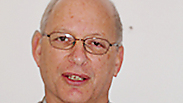 Yoel Rappel grew up in Israel and lived most of his life there. We’re not told if he was born there, but it seems so. He worked 40 years as a journalist and senior program editor at the Israel Broadcasting Authority, Israel’s main radio channel. Before coming to Boston University as Visiting Scholar at the Elie Wiesel Center for Jewish Studies, he also taught at Bet Berl College, the Avshalom Institute for Israel Studies, and served as content manager at the Center for Jewish Identity in Bar Ilan University … all in Israel.
Yoel Rappel grew up in Israel and lived most of his life there. We’re not told if he was born there, but it seems so. He worked 40 years as a journalist and senior program editor at the Israel Broadcasting Authority, Israel’s main radio channel. Before coming to Boston University as Visiting Scholar at the Elie Wiesel Center for Jewish Studies, he also taught at Bet Berl College, the Avshalom Institute for Israel Studies, and served as content manager at the Center for Jewish Identity in Bar Ilan University … all in Israel.
He serves as project manager for the Elie Wiesel Archive. He is the editor of the Hebrew editions of Prof. Wiesel’s books “The Biblical Soul,” “The Hasidic Soul” and “The Talmudic Soul,” which were published in Hebrew by the Yedioth Books publishing house. [Getting everything ready for Elie Wiesel’s coming sainthood -cy]
The Interview
[Rappel points out that it was Wiesel who coined the expression, “Not all victims were Jews, but all Jews were victims.” ]
Wiesel: “The Holocaust is a unique event, but it has a universal significance which must be memorized incessantly.”
[The reason for this, Rappel tells us, is so it will be engraved in people’s minds, so that the events of 1939-1945 will not repeat themselves and the world will not be indifferent and silent*, as it was then.] *A reference to the Yiddish book, “And the World Remained Silent” claimed to have been written by Wiesel.
Wiesel: “Unfortunately, anti-Semitism still exists. It has been alive for more than 2,000 years, and will likely continue living. I thought that the memory of the Holocaust would shame those boasting anti-Semitic opinions. I was wrong. It still exists in different countries, and it seems people are no longer ashamed to be anti-Semitic.”
[Rappel says “the murky wave of anti-Semitism sweeping over the Western world, as well as Eastern Europe (with the recent incidents in Hungary and Ukraine), is fresh.]
Wiesel: “The modern anti-Semite is, first and foremost, anti-Israel. It’s very difficult to separate between the two. There are anti-Semites who are only anti-Israel. Once I thought that anti-Semitism had ended; today it is clear to me that it will probably never end. It might weaken sometimes, but it will continue existing, because in different countries there is no shame in being an anti-Semite. We must remember that anti-Semitism led to Auschwitz. Without anti-Semitism there would have been no Auschwitz.”
[Rappel says that Wiesel is one of the State of Israel’s greatest advocates, and that Wiesel argues that the fundamental problem {today?} is the attitude towards Israel and not anti-Semitism.]
Wiesel: “It’s clear to me that one can’t be Jewish without Israel*. Religious or non-religious, Zionist or non-Zionist, Ashkenazi or Sephardic – all these will not exist without Israel. The State’s existence is the oxygen of the image and ideas of the new anti-Semitism.” *Dangerous, fanatical talk. It follows that if Israel goes, so also do Jews. With that thinking, anything is allowed to Jews to prevent it … is what Wiesel is getting at. The failure of Israel would be another form of “extermination of the Jews,” another “holocaust.” -cy
[Wiesel is asked whether the public dispute over circumcision and ritual animal slaughter also stem from anti-Semitism.]
Wiesel: “In my opinion, it stems first of all from ignorance and disregard of the Jewish faith. Those who raise such ideas and others will soon come up with the idea to cancel Shabbat, so that Jews will rest on Sunday. It’s more of a case of ignorance, and it leads to harassment against the foundations of Judaism.”
[Rappel wants to know if the different phenomena experienced recently by the Jewish community in the United States can be defined as anti-Semitism.]
Wiesel: “There are expressions of anti-Semitism, yet we can’t talk about an anti-Semitic movement but about groups of anti-Semites which operate in different places, and we don’t know how many members they have. This reality must also concern us, because it could expand.”
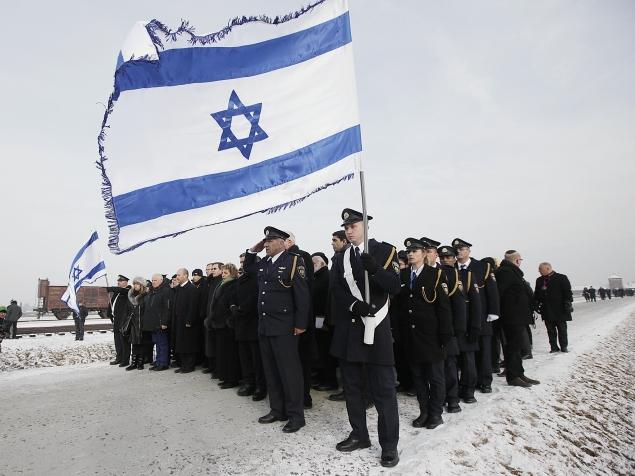
What Wiesel Missed – Members of Israeli parliament, the Knesset, ceremoniously and ostentatiously mark the 69th anniversary of the liberation of Auschwitz in Oswiecim, Poland on Jan. 27, 2014. The delegation spokesman made it a point to say that the difference between then and now is that they now have a state and a military force of their own with which to protect themselves.
2 Comments
Category Featured | Tags: Tags: anti-Semite, anti-Semitism, Auschwitz-Birkenau, Boston University, Holocaust remembrance, Israel, Joel Rappel, shabbat, Yom Hashoah,
Social Networks: Facebook, Twitter, Google Bookmarks, del.icio.us, StumbleUpon, Digg, Reddit, Posterous.
Thursday, August 18th, 2011
Lightly edited on Aug. 21
Was Wiesel a strange choice?
What has Mr. Wiesel ever done for “peace” or, even more to the point, “world peace?” He was a devoted Zionist even in his youth, working as a journalist for Zion in Kampf, a Yiddish newspaper in Paris (see here). He had many contacts with the Irgun terrorist organization and cheered on their every action; he may well have been even more deeply involved with Irgun. He stated in his memoir that “I belonged to the Irgun.” He has supported every illegal military action in which Israel took over more land, homes and livelihoods of Palestinians, right up to his being an apologist for the latest unprovoked attack on Gaza in 2008-09 when the Jews used white phosphorous bombs on civilians.
Wiesel has never sought to act as a peace-maker in these ongoing unbalanced attacks, nor has he criticized or sought to stop the many wars of the United States since he became a citizen in 1963. He has also promoted a virulent anti-Germanism, e.g. “Every Jew should set aside a zone of hate – healthy, virile hate – for what the German personifies and for what persists in the German.” He has never publicly repudiated this statement.
So why was Elie Wiesel chosen for the most prestigious award in the Western world, the Nobel Prize for Peace, in 1986 when it still carried a dignified aura? (It has since lost some of that glow because so many of its recipients, including Wiesel, have lost theirs!) You’ll find the answers in the article below from The New Republic that appeared in November 1986 before the Nobel award ceremony took place on Dec. 10.
Sub-headings and photos have been added by me. -cy
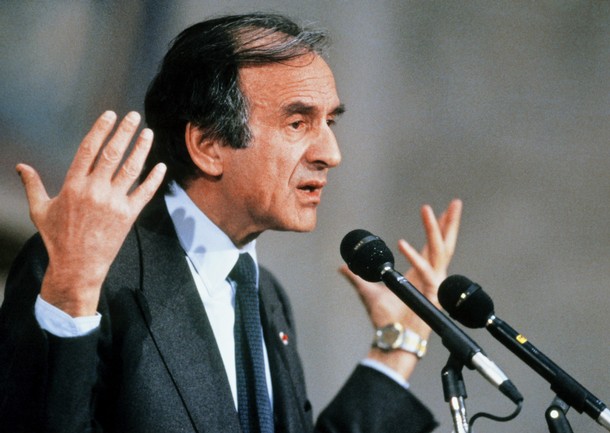
Elie Wiesel gives a speech after the Nobel awarding ceremonies on December 11, 1986.
___________________
Pop Goes Elie Wiesel
How to get a Nobel prize.
by Jacob Weisberg
November 10, 1986
“I was of course very stunned and grateful, and melancholy,” Elie Wiesel told the The New York Times about his initial reaction to winning the 1986 Nobel Peace Prize. “I fell back into the mood of Yom Kippur, serious reflection about my parents and grandparents. It took me half an hour to get out of it.” But when Wiesel finally came to, he told a press conference in New York, “There are no coincidences. If it [winning the prize] happens after Yom Kippur here, then some of my friends and myself have prayed well.”
Actually, they did a little more than pray. Over the past several years, a few of Wiesel’s friends have circled the globe in an intensive effort to win him the prize. Sigmund Strochlitz (in photo below left), who owns a Ford dealership in New London, Connecticut, has directed the offensive. A survivor of Auschwitz, Strochlitz has visited the halls of Congress, the West German Bundestag, the French Assembly, and the Norwegian Parliament on Weisel’s behalf.
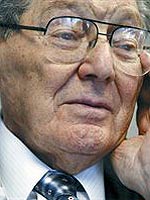 It might sound difficult to lobby for the Nobel Peace Prize. In reality, it’s not so tough. According to the rules of the Norwegian Nobel Committee, several categories of persons are eligible to make nominations. Parliamentary representatives, judges, academic, and former Nobel laureates are among those entitled to send letters of nomination to the committee in Oslo. They’re due by February 1. Strochlitz’s strategy has been to solicit these letters by the bushel. He’s succeeded in getting hundreds of them, including nominations from Francois Mitterand and former Peace prize winners Henry Kissinger, Lech Walesa, and Mother Theresa.
It might sound difficult to lobby for the Nobel Peace Prize. In reality, it’s not so tough. According to the rules of the Norwegian Nobel Committee, several categories of persons are eligible to make nominations. Parliamentary representatives, judges, academic, and former Nobel laureates are among those entitled to send letters of nomination to the committee in Oslo. They’re due by February 1. Strochlitz’s strategy has been to solicit these letters by the bushel. He’s succeeded in getting hundreds of them, including nominations from Francois Mitterand and former Peace prize winners Henry Kissinger, Lech Walesa, and Mother Theresa.
Wiesel’s supporters have concentrated much of their energy on the U.S. Senate. One Senate aide described their campaign as “relentless and heavy-handed.” “Strochlitz would show up every winter and say “it’s time to write letters again,” one staffer said. “He’d say, ‘you did it last year. It’s time to do it again.’ He’d get the senators to send ‘Dear Colleague’ letters to each other in an every-widening circle.” Strochlitz, a close friend of Wiesel’s, denies doing any campaigning.
Here’s how it worked. Strochlitz asked Senator Daniel Patrick Moynihan, for example, to nominate Wiesel, and to request similar letters from ten of his colleagues. Strochlitz provided Moynihan with the names. Of course, many of the legislators Moynihan asked had no idea they could nominate anyone for a Nobel Prize. And a few hardly knew who Elie Wiesel was. The letters they sent are perhaps less flowery than some the Nobel Committee has received in the past:
U.S. Senate
January 28, 1984
Members of the Committee:
It is my honor to propose Mr. Elie Wiesel for the 1984 Nobel Prize for Peace. As you well know, Mr Wiesel has dedicated most of his life toward the goal of peace throughout the world. In my opinion, you could not go wrong by awarding the Nobel Peace Prize to this most deserving gentleman.
With Respect
Barry Goldwater
By Strochlitz’s count, more than 50 senators and 140 representatives have written to Oslo on Wiesel’s behalf. More than 70 members of the West German Bundestag have also nominated Wiesel. After getting a few dozen senators under his belt, Strochlitz began grouping them in interesting ways. One year he got the entire Massachusetts congressional delegation to nominate Wiesel. Another year he solicited letters from all the members of the Senate Banking Committee.
Boston University’s John Silber helps out
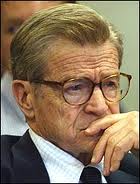 Strochlitz was helped by John Silber (right), the president of Boston University, where Wiesel teaches. Silber called Strochlitz “the real strategist and campaigner.” “Strochlitz did everything in his power,” Silber said. “he would say to me: ‘John, you know these people in Congress.’ I’d write to them and send copies of their responses to Strochlitz, so he could keep track of everything we were doing.” Silber said that he is especially delighted at Wiesel finally winning the prize, since it is the second such award bestowed upon someone associated with his school. Martin Luther King, who won the Peace Prize in 1964, was a student at Boston University during the 1950’s.
Strochlitz was helped by John Silber (right), the president of Boston University, where Wiesel teaches. Silber called Strochlitz “the real strategist and campaigner.” “Strochlitz did everything in his power,” Silber said. “he would say to me: ‘John, you know these people in Congress.’ I’d write to them and send copies of their responses to Strochlitz, so he could keep track of everything we were doing.” Silber said that he is especially delighted at Wiesel finally winning the prize, since it is the second such award bestowed upon someone associated with his school. Martin Luther King, who won the Peace Prize in 1964, was a student at Boston University during the 1950’s.
In Silber’s letters to the Nobel Committee, he argued that Wiesel was not just a spokesman for survivors of the Holocaust, but a voice for victims everywhere. Each year that he re-nominated Wiesel, he wrote the committee about some new effort of Wiesel’s on behalf of the oppressed–whether his work for Cambodian boat people, or Soviet Jews, or Arab refugees, or those disappeared in Argentina. A typical letter from Silber to the committee points out that “Wiesel traveled at considerable risk to his personal health and safety into the jungles of Honduras, where he met with the Miskito Indians.” Attached was an op-ed piece Wiesel published in the Los Angeles times, detailing the Miskito’s plight. As Silber put it one year, “I am sure that my letter will not be the first, nor indeed the only such letter to reach you…”
Another of Silber’s tactics has been to suggest appropriate anniversaries for the Nobel Committee to make use of in honoring his friend. In 1984 he wrote of the connections between Wiesel and Orwell. The following year Silber’s letter reminded the committee that it was the 40th anniversary of the liberation of the death camps. Wiesel’s friends searched endlessly for a new “peg” on which to hang the same old story.
Silber said Wiesel never inquired about the effort to get him the prize, though he was aware of it. “He never asked anybody, never asked me, never asked Strochlitz,” Silber said. “We said, ‘stand still, Elie. Step aside, do your work. Don’t worry about our work, which is to make them [the Nobel Committee] aware of yours.'” Silber added, “Nobody wins unless the Nobel Committee knows about them.” Silber and Strochlitz both vociferously decline any share of the credit for Wiesel’s prize in 1986. “That would be like the trainer claiming he’s the race horse,” Silber said. “We may have fed the oats, and curried the flanks. But that horse could run.”
Wiesel gained by being a “non-controversial” selection
According to all published reports, Wiesel has been on the Nobel Committee’s short list for the past few years. And this year members of the jury thought it necessary to make a non-controversial selection. Last year’s prize, which was shared by Soviet doctor Yevgeny I. Chazov, of the Boston-based Physicians for the Prevention of Nuclear war, humiliated the committee when it was revealed that Chazov had denounced laureate Andrei Sakharov several years earlier. In 1986 it was the West’s turn to be mollified.
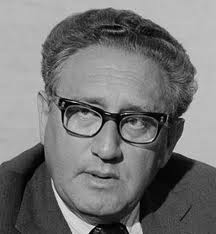 Looking down the list of past winners, one wonders what the prize is actually for. Some years it appears to reward good deeds on a large scale. Other times, it seems to honor political leadership. On a few occasions, such as 1973, when it was awarded jointly to Henry Kissinger (left ) and Le Duc Tho, it has seemed closer to a war prize than a peace prize. These days, it’s a rather amorphous accolade–sort of a moral hall of fame for the indisputably decent.
Looking down the list of past winners, one wonders what the prize is actually for. Some years it appears to reward good deeds on a large scale. Other times, it seems to honor political leadership. On a few occasions, such as 1973, when it was awarded jointly to Henry Kissinger (left ) and Le Duc Tho, it has seemed closer to a war prize than a peace prize. These days, it’s a rather amorphous accolade–sort of a moral hall of fame for the indisputably decent.
Whatever the Nobel Peace Prize signified, it’s clear that people lobby for it. Nobody seems quite sure what Japanese prime minister Eisaku Sato won his Nobel for in 1974, but it’s well known that he hired a public relations firm to help his campaign along. Jimmy Carter, Armand Hammer, and Indira Gandhi have been among the more recent campaigners who appear to have failed in drives for the prize. (Hammer reportedly once sent Ann Landers a jade necklace with a note asking if she could help him get nominated for the prize.) Mohandas Gandhi never campaigned for, and never got, the most coveted prize on planet earth.
Because the prize has such prestige, it’s a bit disquieting to discover that the winners actually wanted it. Nobody wants to think that the Mother Theresa’s of the world bid for earthly reward. In fact, Mother Theresa never did campaign for the Nobel Peace Prize. But she seems to be the exception, Elie Wiesel the rule. ~
____________________________________________________________
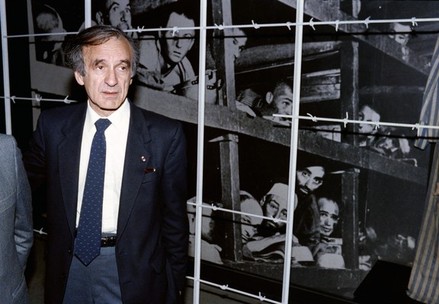
This is the photograph (in background) in which the New York Times identified Elie Wiesel, as a 16 year-old boy, for the first time in Oct. 1983 when the campaign for a Nobel Prize for Wiesel had gotten underway. In 1986, just days after winning the coveted prize following his three-year campaign, he stands in front of the photo during his visit on December 18, 1986 to the Holocaust Memorial Center ‘Yad Vashem’ in Jerusalem.
6 Comments
Category Featured | Tags: Tags: Boston University, Elie Wiesel, John Silber, Nobel Peace Prize, Sigmund Strochlitz, The New Republic,
Social Networks: Facebook, Twitter, Google Bookmarks, del.icio.us, StumbleUpon, Digg, Reddit, Posterous.
Monday, January 10th, 2011
Has conformism completely overtaken free, questioning, adversarial minds on today’s university campuses?
February 1st is the deadline for us to receive essays in our “A Question of Ethics” Essay Contest, for which we have $1000.00 set aside for prizes. That is just 21 days from the date of this posting, yet we have not, as of this date, received even one.
Can it be that $500.00, $250.00 and $125.00 doesn’t tempt even a few students out of the thousands at Boston and Chapman Universities, where we have advertised our contest? According to the odds, we could expect at least a handful who would be independent enough, and smart enough to figure out that the fewer the entries, the greater the chance of winning. After all, the prize essays would not necessarily have to be of doctoral dissertation quality! They would only have to follow the evidence presented on this website, use proper grammar and punctuation, and be posted here with the winner’s name. Ay, there’s the rub.
Your name and your essay will be posted on this site. What sort of retaliation by teachers, administrators, and your fellow students would you have to endure? And would the stigma follow you for the rest of your life? Might you possibly have difficulty, as someone identified as flirting with “holocaust denial”, with that post-graduation trip to Europe that you’re hoping to make? The idea of such repercussions makes even the $500 of little value, and the intellectual challenge that may have lit a small fire in your mind is easily damped down and put out. Why chance it? The drawbacks outweigh the benefits.
Yes, we understand. We offered this essay contest for straightforward reasons, but we also knew it would be a good lesson in how the weight of political correctness on our college campuses, particularly around this issue and even more particularly around the person of Elie Wiesel, is strangling freedom of thought, freedom of intellectual pursuit in areas of politically-enforced belief structures, and freedom to express your “different” views openly.
Our contest will either bear fruit in the form of essays to read, judge and discuss, or it will bear fruit as an example of the suffocating, silencing effect of the politically-enforced “new religion” of our time—the sacred, unquestioned memory of “holocaust survivors.” But bear fruit it surely will. It is up to you, students of Boston University and Chapman University in Orange CA, which it will be.
Herewith, for the last time, is our original announcement:
“A Question of Ethics” Essay Contest announced for Boston and Chapman University students; $1000 in prizes
We are pleased to announce the first East Coast—West Coast “A Question of Ethics” Essay Contest for students enrolled at Boston University in Massachusetts and Chapman University in Orange, California.
The winning essay will be awarded $500; second prize will receive $250; two honorable mentions $125 each. The winning essays will be published on the web site Elie Wiesel Cons The World.
The essays must analyze one or more ethical issues surrounding Elie Wiesel as they are presented on the pages of the website Elie Wiesel Cons The World. These issues may include [not in order of importance]
- Prof. Wiesel’s refusal to show his claimed tattoo.
- The documents from Buchenwald that do not support Wiesel’s presence there.
- His claim to be in the famous Buchenwald Liberation Photo when, according to his book, he was deathly ill in the hospital at the time.
- His close association with the Irgun terrorist gang in the late 1940’s.
- The questions surrounding the authorship of his first book, Un di Velt Hot Gesvign, allegedly 866 pages written in less than two weeks while on a ship crossing the Atlantic.
- The insistence that his book Night, read by school children all over the world, is a factual account of his experience at Auschwitz and Buchenwald.
Though the essays must utilize the information made available on Elie Wiesel Cons The World, information from other sources is acceptable as additional material. Our objective is for the essayists to examine the ethics challenges facing Prof. Wiesel in light of the information we have provided at our website.
Deadline for essays to be received is Feb. 1st, 2011. To be considered for a prize, essays must be a minimum of 500 words. Proof of registration as a student at Boston or Chapman University must accompany the essay. This can be a copy of one’s current semester course registration along with a University ID card. Manuscripts should be emailed to [email protected] with the subject line: Ethics Essay Contest.
Contact:
Carolyn Yeager
c/oCODOH, PO Box 439016
San Ysidro, CA 92143
Email: [email protected]
Web: www.eliewieseltattoo.com
No Comments
Category Featured | Tags: Tags: Boston University, Chapman University, essay contest,
Social Networks: Facebook, Twitter, Google Bookmarks, del.icio.us, StumbleUpon, Digg, Reddit, Posterous.
Tuesday, October 12th, 2010
Robert A. Brown, President of Boston University: “Elie Wiesel is a man of integrity and would not stoop to fabrication.”
With this statement, Dr. Brown replied to my September 23rd email message and postal letter to him, and to those copied, which I am publishing here.
Robert A. Brown
Office of the President
1 Silber Way, 8th Floor
Boston Ma 02215
September 23, 2010
Re: Prof. Elie Wiesel
Dear President Brown:
I recognize that Boston University has a long and admirable tradition of support for the humanities. One of your most prominent, most politically conspicuous faculty members is Elie Wiesel, who is associated in the public mind with a host of worthy, even noble causes, including being the recipient of the Nobel Peace Prize.
Particularly because of the honored position Professor Wiesel holds at BU, the questions that are being raised about his Holocaust testimony bother me, and I think if you were aware of them they would bother you, too. First is the lack of evidence that he has an Auschwitz tattoo, though he repeatedly claims to have one. As recently as last March, at Dayton University in Ohio, a student asked if he still has his concentration camp number, and he said, “I still have it on my arm.” However, his own 1996 video, in which his bare forearms are exposed to the camera, reveals no tattoo on his left arm, where it should be.
This, along with archival documents primarily from Buchenwald that show a Lazar Wiesel born in 1913, not 1928, who was there with his brother Abram, put his entire account of his concentration camp experiences of 1944-45 into question. No documentation for Shlomo Wiesel/Vizel, Elie’s father, or of a Lazar/Eliezer Wiesel with Elie Wiesel’s birth date of Sept. 30th, has been revealed.
Still other questions being raised concern his authorship of the original Yiddish version of Night. The brief description he gives of when, where and how he wrote And the World Remained Silent contain contradictions and improbabilities. In addition, there are major factual differences between key passages in Night, the English derivative of the original Yiddish language book, and Prof. Wiesel’s memoir All Rivers Run to the Sea. To mention just one—in the former, his foot is operated on before the evacuation to Buchenwald in January 1945, while in the latter it becomes his knee that is operated on! These are just a few of the red flags that are raised when studying Prof. Wiesel’s testimony with a critical eye.
I realize it is not my responsibility, but rather yours, to maintain the integrity of your faculty. However, I feel an obligation to bring this information to your attention because it is information that is gaining the attention of the world, and more importantly of your students, through various venues and investigations, and may reflect poorly on your great university.
Respectfully yours,
Carolyn Yeager
PO Box 439016
San Ysidro, CA 92143
Email: [email protected]
Web: http://www.eliewieseltattoo.com/
cc: David K. Campbell, Provost
Virginia Sapiro, Dean of the College of Arts and Sciences
Daniel Dahlstrom, Chair, Department of Humanities
Aaron Garrett, Assoc. Chair, Dept. of Humanities
Walter Hopp, Director, Undergraduate Studies, Dept. of Humanities
David Roochnik, Director, Graduate Studies, Dept. of Humanities
Members of the Board of Trustees
Robert A. Knox, Chairman
John P. Howe III, Vice Chairman
Jonathan R. Cole
Richard C. Godfrey
Robert J. Hildreth
Eric S. Lander
Alan M. Leventhal
J. Kenneth Menges, Jr.
Christine A. Poon
Adam. W. Sweeting
On September 27, I received a polite reply, which did not indicate whether Dr. Brown had looked at any of the pages I linked to on the Elie Wiesel Cons The World website.
Dear Ms. Yeager:
Thank you for your e-mail message of September 23, in which you express concerns about the accuracy of Dr. Wiesel’s testimony. I have no doubt that he is a survivor of the Holocaust and he has, thoughout his adult life, been a most eloquent witness to its atrocities. He is a man of integrity and would not stoop to fabrication.
Sincerely,
Robert A. Brown
We wanted to give the Boston University administration fair warning of what we are up to, and an opportunity to address the “Wiesel question” themselves.
Having done that, and after sending them a further reply suggesting that they look into the matter, and with no further response, we now turn to the students at BU. We have sent a message to student organizations, student publications and the local Boston media in a major effort to inform, encourage and assist students on campus to ask for answers to these questions. We believe there are individuals and organizations at BU who truly care about the ethical integrity of their university and its faculty, and who want to know the facts about all things, no matter how sensitive—not just accept what they are being taught by a timid, establishment faculty.
We suggest there is a simple request that Boston University students can make of Prof. Wiesel that their administrators are apparently unwilling to make. They can ask him to show his tattoo. He says he is a humble representative of the survivors of the concentration camps. Many Auschwitz survivors prove their presence in that camp by pointing to the number tattooed on their left forearm. Why not Elie Wiesel? Is he not one of them?
We’re urging students at BU, and all our readers as well, to write or call the following persons asking for their cooperation in a search for honest answers. Thank you for your activism.
Department of Philosophy
745 Commonwealth Avenue, Room 516
Boston, Massachusetts 02215
Phone:617.353.2571 | Fax:617.353.6805
Department e-mail:[email protected]
Department Chair: Professor Daniel Dahlstrom
Phone: 617.353.4583 | E-mail: [email protected]
Associate Chair: Professor Aaron Garrett
Phone: 617.358.3617 | E-mail: [email protected]
Director of Undergraduate Studies: Professor Walter Hopp
Phone: 617.358.4228 | E-mail: [email protected]
Director of Graduate Studies: Professor David Roochnik
Phone: 617.353.4579 | E-mail: [email protected]
Director of Graduate Admissions: Professor Allen Speight
Phone: 617.353.3067 | E-mail: [email protected]
Administrator: Matthew Roselli
Phone: 617.353.2572 | E-mail: [email protected]
Senior Program Coordinator: Lesley Moreau
Phone: 617.353.2571 | E-mail: [email protected]
Elie Wiesel: University Professor, Andrew W. Mellon Professor in the Humanities and Professor of Philosophy and Religion
E-mail: [email protected]
The full Dept. of Philosophy faculty addresses can be found on our Boston University Project page.
* * *
The Daily Free Press 648 Beacon St. Boston, MA 02215
Tel.: (617)236-4433 Fax.: (617)236-4414
The Daily Free Press welcomes comments and corrections from readers. To write a letter to the editor, send fewer than 500 words to [email protected] . Please include your phone number so that you can be contacted.
Neal J. Riley– Editor-in-Chief ([email protected])
Josh Cain – Managing Editor ([email protected])
Saba Hamedy – Campus Editor([email protected])
Chelsea Feinstein – Editorial Page Editor ([email protected])
WTBU Boston University’s student radio station broadcasting online.
General Manager – [email protected]
News Editor – [email protected]
Programming Editor – [email protected]
10 Comments
Category Featured | Tags: Tags: Boston University, BU Dept. of Philosophy, Robert A. Brown,
Social Networks: Facebook, Twitter, Google Bookmarks, del.icio.us, StumbleUpon, Digg, Reddit, Posterous.
Monday, October 11th, 2010
The Elie Wiesel Center for Judaic Studies at Boston University will host the final two free lectures by Elie Wiesel on Monday, Nov. 1 and Monday, Nov. 8. This is a good opportunity for students or Boston residents to question Wiesel in person.
Both lectures begins at 7 p.m. and are held in the Boston University Metcalf Hall, George Sherman Union, 2nd Floor, 775 Commonwealth Avenue. The lectures are free and open to the public. A ticket is not required. Seating is not reserved. Doors open at 6 p.m. Sign language interpreters will be available. No University parking is provided. No seating in the auditorium after the program begins. For more information, call 617-353-2238. Email: [email protected]
Monday, November 1, 2010
The Rebbe of Ger: A Tragedy in Hasidism
Introduction by Elaine Kirshenbaum, Boston University Trustee
Monday, November 8, 2010
Ethos and Contemporary Issues
Introduction by Rabbi Joseph A. Polak, Director, Hillel Foundation; Rabbi to the Jewish Community at Boston University
To our readers: Please see Note (Oct. 27) added to the post of Oct. 26 “Religion Department reveals interesting insights into Boston University.”
No Comments
Category News | Tags: Tags: Boston University, Elie Wiesel Center for Judaic Studies, Hillel Foundation,
Social Networks: Facebook, Twitter, Google Bookmarks, del.icio.us, StumbleUpon, Digg, Reddit, Posterous.

 Yoel Rappel grew up in Israel and lived most of his life there. We’re not told if he was born there, but it seems so. He worked 40 years as a journalist and senior program editor at the Israel Broadcasting Authority, Israel’s main radio channel. Before coming to Boston University as Visiting Scholar at the Elie Wiesel Center for Jewish Studies, he also taught at Bet Berl College, the Avshalom Institute for Israel Studies, and served as content manager at the Center for Jewish Identity in Bar Ilan University … all in Israel.
Yoel Rappel grew up in Israel and lived most of his life there. We’re not told if he was born there, but it seems so. He worked 40 years as a journalist and senior program editor at the Israel Broadcasting Authority, Israel’s main radio channel. Before coming to Boston University as Visiting Scholar at the Elie Wiesel Center for Jewish Studies, he also taught at Bet Berl College, the Avshalom Institute for Israel Studies, and served as content manager at the Center for Jewish Identity in Bar Ilan University … all in Israel.






